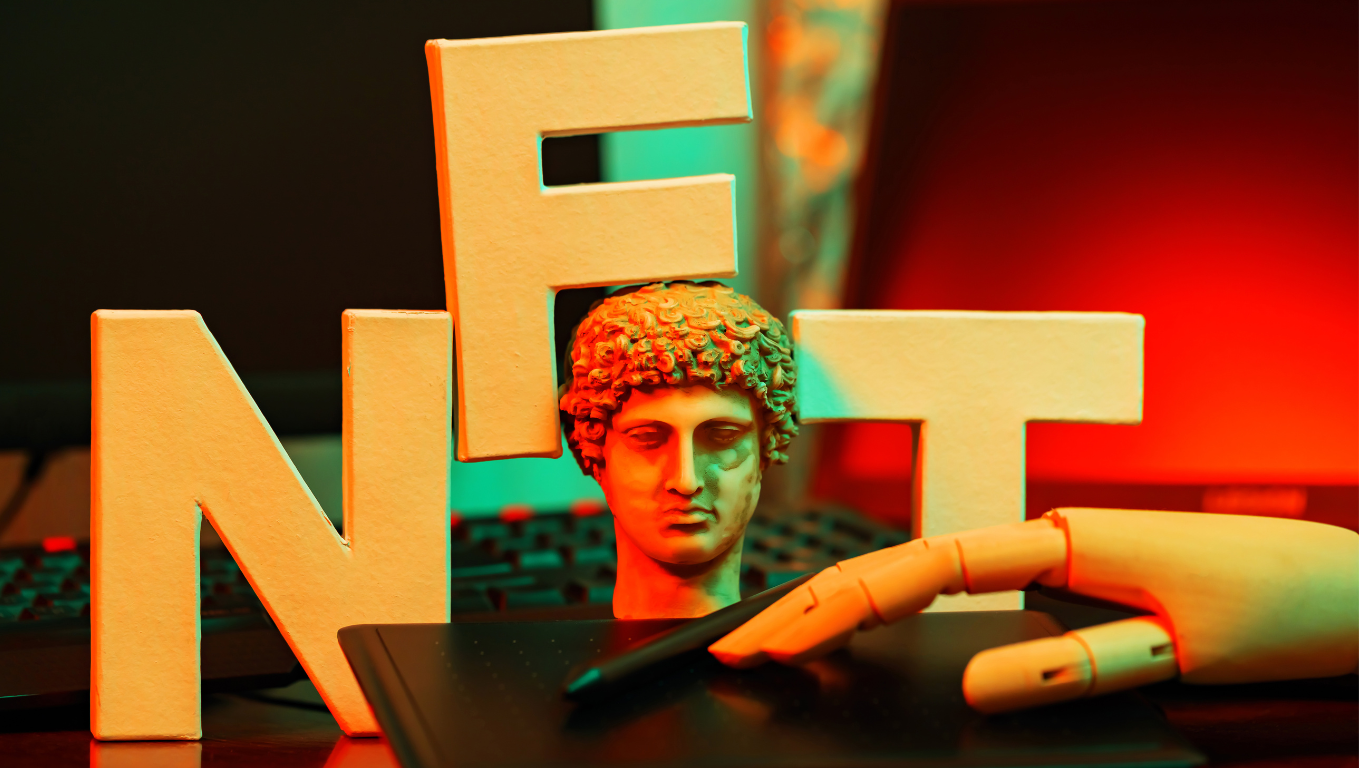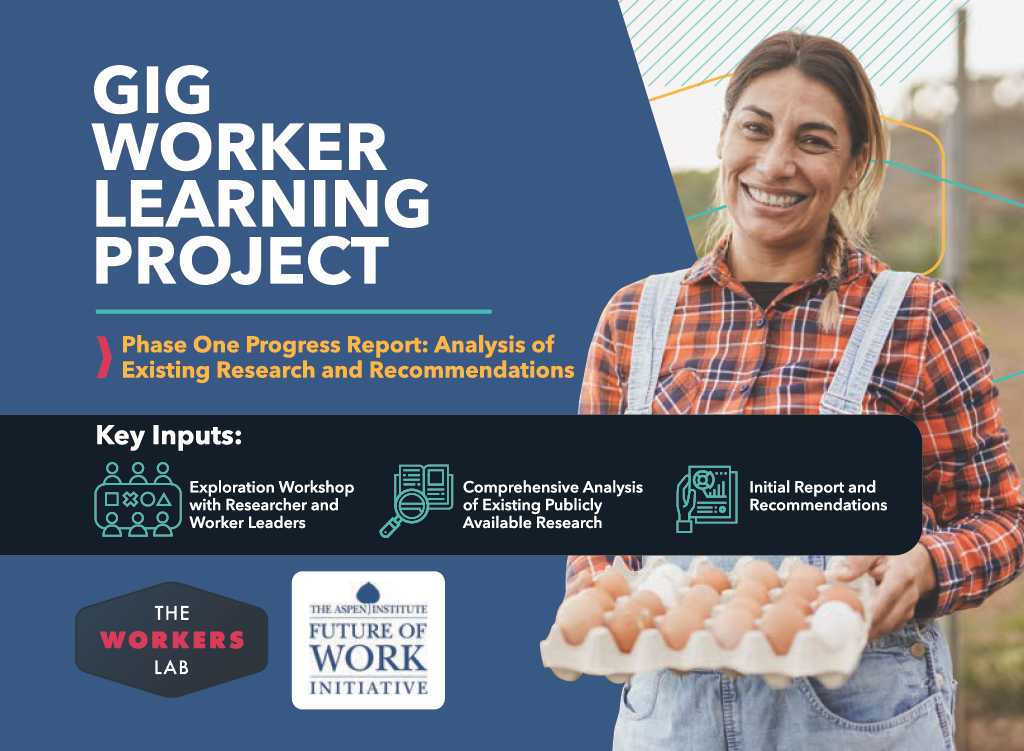NFTs, Smart Contracts, & DAOs
NFTs, Smart Contracts, & DAOs
A Resource for Creatives
A report to help creatives capture the opportunities of blockchain technologies, while protecting themselves from legal risk
When we started seeing many BIPOC artists moving into the blockchain space several years ago, we started building our own expertise in this area.
That’s why we commissioned Alex Glancy at Gundzik Gundzik Heeger LLP to author this report exploring the legal challenges artists face on the blockchain.
To support creatives as they engage with this new technology, this report seeks to provide information in the legal areas of copyright, business entities, securities, contracts, and trademark, as applied to these emerging tools.
Ultimately, we hope this report serves as a resource to help creatives capture the opportunities of blockchain technologies, while protecting themselves from the risks.
Gig Worker Learning Project: Phase One Report
Gig Worker Learning Project
Phase one progress report
The Gig Worker Learning Project is a valuable resource for anyone seeking to better understand gig workers and the challenges they face.
For several years now, the conversation about gig work and the future of work has been hampered by the lack of good data. That’s why we’re thrilled that Sol Center’s first grant supports the Gig Worker Learning Project, a participatory research project by The Workers Lab and the Aspen Institute Future of Work Initiative, seeking to understand gig workers’ needs and the solutions that will impact them most.
The first phase of the project, which took place over 2022, included early stakeholder outreach and a landscape scan of existing gig workers research. The Gig Worker Learning Project published its findings from that analysis in February 2023, and considers several questions, such as:
- What is the “Gig Economy”?
- What are gig workers doing to make money?
- Who are gig workers?
- How do digital platforms affect the experiences of gig workers?
- How are gig workers using their incomes?
- What kinds of benefits and protections exist for gig workers?
This is a valuable resource for anyone seeking to better understand gig workers and the challenges they face, and definitely worth a read!
The Other Side of the Storm
The Other Side of the Storm
What do Black immigrant domestic workers in the time of COVID-19 teach us about building a resilient care infrastructure?
Kim Freeman Brown, Marc Bayard
Presented by The Institute for Policy Studies in partnership with
National Domestic Workers Alliance (NDWA) We Dream In Black Program
If we hope to build protections that support all workers, we need to understand the challenges faced by those most excluded from our current systems of support.
We’ve been closely following the work of the National Domestic Workers Alliance’s We Dream in Black initiative. Their most recent research and report highlights the experiences and priorities of domestic workers who are Black, immigrant women. The findings highlight how important an intersectional lens is to designing and delivering benefits and protections for all.
If we hope to build protections that support all workers, regardless of their job, identity, or ability, then we need to understand the challenges faced by those excluded from our current systems of support, and most importantly, the solutions they say they want.
Disability Justice for Individual Artists
Disability Justice for Individual Artists
Best practices for funding artists with disabilities
Grantmakers in the Arts
Grantmakers in the Arts is the only national association of both public and private arts and culture funders in the US, including independent and family foundations, public agencies, community foundations, corporate philanthropies, nonprofit regrantors, and national service organizations – funders of all shapes and sizes across the US and into Canada.
In May 2022, we collaborated with our friends at Grantmakers in the Arts to uplift the challenges that asset caps on benefits and assistance programs create for those with disabilities.
The webinar featured Reveca Torres, Executive Director of BACKBONES, and grantee in CCI’s Spinal Cord Injury (SCI) Artist-Innovator Fund, Laura Poppiti, Program Director and leader of CCI’s grantmaking programs including the SCI Artist Innovator Fund, and Alex Nock, principal at Penn Hill Group, a DC-based government affairs firm.
Participants discussed the ways asset caps impede grantmaking to artists with disabilities, including specific challenges they encountered, strategies to overcome them, and opportunities for shared advocacy on this topic.
Watch the webinar below!
Benefits for Freelancers
Benefits for Freelancers
Freelancers Union insurance
Freelancers Union
Freelancers Union is the largest and fast-growing organization representing the 56.7 million independent workers across the country. They provide their 500,000+ members a powerful support system and voice through policy advocacy, benefits, resources and community.
Freelancers Union is demonstrating new ways of building collective power and protections for independent workers.
Freelancers Union offers health, vision, and dental insurance, as well as life, disability and liability insurance (at competitive rates), alongside important advocacy, education and community for those who work independently.
As a membership organization and 501 c(4), they are demonstrating new ways of building collective power and protections for independent workers.
Debt Collective
Debt Collective
Building collective power via a new debtors' union
Debt Collective
Debt Collective is a debtors’ union fighting to cancel debts and defend millions of households. Join them to build a world where college is publicly funded, healthcare is universal and housing is guaranteed for all.
Debt Collective is building new forms of collective power for debtors.
Debt Collective is the nation’s first debtors’ union, and they organize around intersecting forms of indebtedness – from medical debt to carceral debt, housing debt to student debt – that characterize life for working people, disproportionately in Black and Brown communities.
The Debt Collective’s work shows that people do not go into debt because they live beyond their means. They go into debt because they are denied the means to live. Housing, education, and healthcare are all out of reach for most people, and people are even forced into debt for their own incarceration. The Debt Collective organizes debtors, including artists, to collectivize their debt and their political voice to force debt relief and changes to the legal and financial system to protect individuals from predatory financial practices. Debt Collective is building power to decommodify basic needs—education, food, shelter, and health—and make sure everyone has a material share of what is rightfully theirs.. Its recent significant wins of student debt relief in 2022 have elevated conversations about how debt exacerbates the racial wealth gap.

